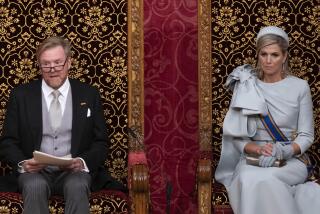The Burden Is on Botha
- Share via
President Pieter W. Botha has given the South African parliament the most specific commitment yet to dismantle apartheid, to end the odious pass law that has controlled the movement of the black majority, to share power among all people, and to assure the full rights of citizenship for the population regardless of race. Many of his words were no more than an echo of what he had said a year earlier. But there was a new specificity. The government, for example, has set a date, July 1, to abolish the pass law. That specificity raises new hopes, and new risks.
One obvious risk is that Botha will move with such deliberate caution that events will overwhelm him and the possibility for peaceful change will be lost. That risk was increased by the government’s failure once again to respond to the remarkable opportunity afforded by the decision of black parents and their youngsters to end temporarily the boycott of the schools. He ignored their appeal to end the state of emergency. But he promised action to equalize education--a recognition of the woefully inferior schools that serve the black majority.
There is an even greater risk--the risk of fundamental misunderstanding.
“We believe that human dignity, life, liberty and property of all must be protected, regardless of color, race, creed or religion,” Botha told Parliament. “We believe that a democratic system of government, which must accommodate all legitimate political aspirations of all the South African communities, must be negotiated. All South Africans must be placed in a position where they can participate in government through their elected representatives.”
But those brave words evoked no enthusiasm from the leaders of the black majority for very good reason: The blacks remain convinced that his rhetoric masks a commitment to retain white supremacy, to maintain racial separation in self-governing areas, to insist that separate can be equal when it never has been.
Botha’s renewed promise to negotiate drew no response, because the invitation is ambiguous. Many of those most fit to negotiate remain locked up or under restrictions. Nelson Mandela, the most respected nationalist among the blacks, is an obvious example. Last year, and again this year, Botha proposed impossible conditions for his release. That sort of game-playing only erodes confidence in the validity of the government’s offer to negotiate.
The White House has said that it will wait to judge the new proposals on the basis of how Botha implements his commitment to end apartheid. There is no alternative. The burden is now on Botha to prove that he means what he says, and that he is open to an accommodation acceptable to the black majority. Before it is too late.
More to Read
Sign up for Essential California
The most important California stories and recommendations in your inbox every morning.
You may occasionally receive promotional content from the Los Angeles Times.













